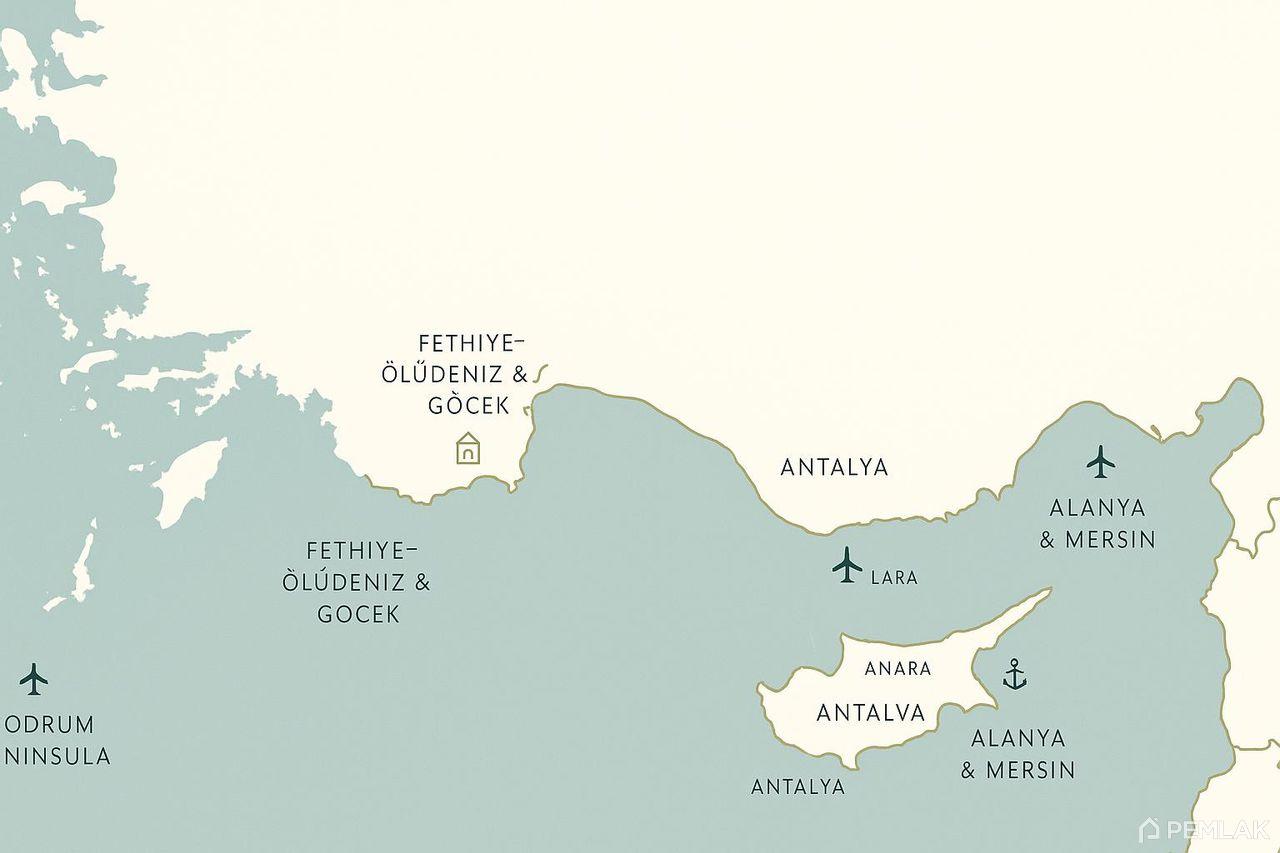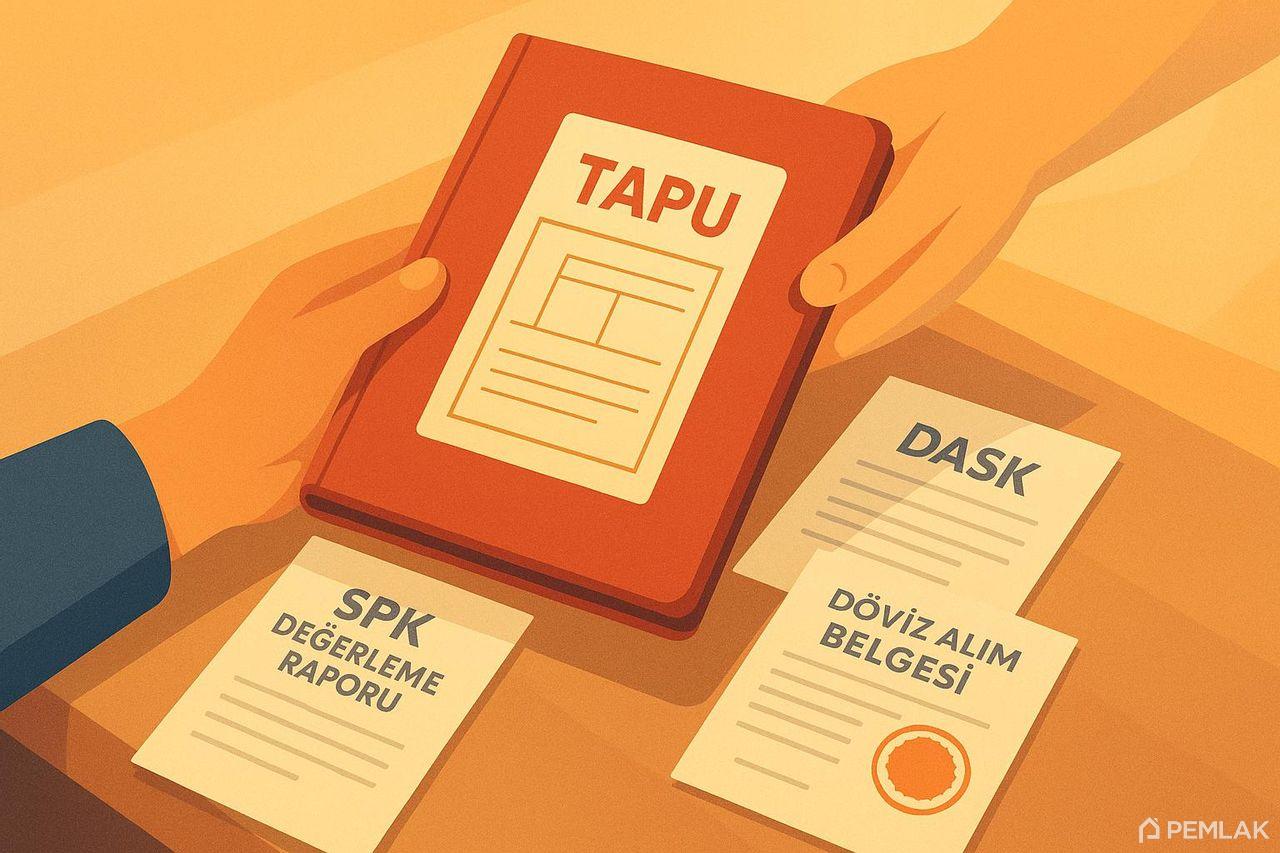Buy a Holiday Home in Turkey – Enjoy the Mediterranean Lifestyle

Turkey makes buying a holiday home straightforward for foreigners: title transfers happen at the Land Registry (Tapu) with a 4% title deed tax, compulsory DASK earthquake insurance, and a valuation report (SPK-approved) that’s mandatory for foreign buyers. Many banks lend to foreigners (often 50–70% LTV), but most buyers pay cash. Short-term rentals (≤100 days) now require a national permit and unanimous condo-owner consent under Law 7464. A home of $200,000+ can qualify you for a renewable short-term residence permit (subject to local rules), and $400,000+ in eligible property can qualify for citizenship by investment (3-year hold, extra due-diligence). Annual property tax is low (about 0.1–0.2% of cadastral value for residences). You’ll also need a Foreign Currency Purchase Certificate (Döviz Alım Belgesi) showing you converted the purchase price into TRY before transfer.
We Recommend
A daydream that becomes a plan
If you travel constantly, the airport becomes your second living room: lounge espresso, boarding chimes, a carry-on that knows the way. But on certain flights—descending over Antalya’s jade water or Bodrum’s whitewashed hills—the thought won’t leave: What if I had a place here? A pied-à-terre that doubles as an asset. Morning swims instead of hotel check-outs. A safe, sunny base in the Mediterranean you can use, rent, and one day pass on.
This guide turns that daydream into a concrete, step-by-step plan—tailored for people who fly often and think like investors.
Why Turkey now?
Sun + access + value. Turkey’s south and west coasts deliver 300+ days of sun in places like Antalya, Kaş–Kalkan, Fethiye–Ölüdeniz, Bodrum, and Çeşme–Alaçatı—linked by nonstop flights into Istanbul (IST) year-round and Antalya (AYT), Dalaman (DLM), and Bodrum (BJV) seasonally. Relative to other Mediterranean hubs, cost-of-ownership is lean (low annual property taxes, affordable services), and you can structure usage as a lifestyle-first investment with controlled rental weeks.
Market note: foreign buyer share fell in 2024–2025 amid higher thresholds and tighter rules—good news if you prefer calmer negotiations and a buyer-friendly pace.

The coastal “fit test”: where does your lifestyle live?
Antalya (Konyaaltı, Lara)
Urban-by-the-sea with year-round life, hospitals, malls, international schools, and an airport 25–40 minutes from most districts. Strong snowbird and medical-wellness demand; solid winter occupancy.
Kaş & Kalkan
Boutique, hilly, stone-clad villas with infinity pools and cinematic sunsets. Ideal for executive escapes and premium weekly rentals. Steeper terrain means view premiums.
Fethiye–Ölüdeniz & Göcek
Family-friendly marinas, turquoise bays, and a lively expat network. Apartments near marinas and modern villas in Ovacık/Hisarönü are popular with seasonal renters.
Bodrum Peninsula
Design-driven, brand-name resorts, beach clubs, and celebrity chefs. Higher entry prices; Aegean vibe with international cachet. Own here for lifestyle ROI first.
Çeşme & Alaçatı (İzmir)
Wind, kites, stone houses, cobblestone charm. Excellent for long weekends if you split time between Europe and the Middle East.
Alanya & Mersin
Warmer micro-climates, new-build apartments with amenities. Strong value-for-money and rising interest; good if you prioritize budget without skimping on the sea.
Real Estate Ownership is simple (when you follow the playbook)
The title deed (Tapu) is the ultimate proof of ownership and is issued only by the Land Registry (Tapu) directorates—notaries do preliminaries, but the transfer itself is a Land Registry act. Ownership passes at the moment your name is entered and the TAPU is printed.
Your 10-step path:
- Get a Turkish tax number (Vergi Numarası).
- Open a Turkish bank account (usually needed to move funds and receive the FX certificate).
- Reserve the property (small refundable deposit).
- Independent legal due diligence: verify title is clean (no encumbrances), zoning/use, and that the building has—ideally—İskan (habitation certificate) and kat mülkiyeti (full condominium title).
- Appraisal (valuation) report by an SPK-licensed firm (mandatory for foreign-involved sales since 2019).
- DASK (earthquake) insurance policy (compulsory for residential properties).
- Foreign Currency Purchase Certificate (Döviz Alım Belgesi)—a bank issues this after converting your funds to TRY for the Land Registry. Required in foreigner purchases since Jan 24, 2022.
- Title transfer at the Land Registry (bring ID, sworn translator if needed, DAB, valuation, DASK, receipts for fees).
- Utilities & site registration (electricity, water, HOA).
- Post-close filings (tax, rental permit if you plan STR).
Costs you’ll actually pay
Up-front:
- Title deed transfer tax: 4% of the declared value (commonly negotiated 50/50 but often paid by buyer in practice).
- Appraisal (valuation) report: market-dependent (typically a few hundred dollars).
- DASK insurance: low annual premium, mandatory.
- Translator & misc. admin: modest.
- Lawyer (optional but recommended): flat fee.
Recurring:
- Annual property tax (Emlak Vergisi): ~0.1–0.2% of cadastral value for residences (higher in metropolitan municipalities), paid in two installments (spring & Nov).
- DASK renewal, home insurance, HOA (aidat), and utilities.
- Rental income tax (if you rent): progressive; non-residents are taxed on Turkey-source income only and can use treaty relief where applicable.
VAT? New builds can carry 1% or 18% VAT depending on size/category; many resale transactions are exempt. Your lawyer will structure this correctly.
Short-term rentals: yes, but read this carefully
Since Jan 1, 2024, Law No. 7464 created a strict national regime. To rent ≤100 days, owners must obtain a tourism rental permit from the Ministry of Culture & Tourism (often via e-Devlet), display an official plaque, and—crucially—provide unanimous consent of all condominium owners in the building (with additional unit-share limits in mixed buildings). Heavy fines apply for non-compliance. This law reshaped Airbnb/VRBO supply; plan accordingly.
Takeaway: If weekly rentals are core to your ROI, target buildings explicitly designed for tourism use (or villa neighborhoods without shared freeholds), and confirm permitability before you sign.
Residency & citizenship pathways (optional, not mandatory)
- Property-based residence permit: Foreigners who acquire property in Türkiye can qualify for a renewable short-term residence permit under Law No. 6458. Since recent updates, $200,000+ value is widely cited as the minimum threshold for property-based residency (check neighborhood “closed zones” and current provincial rules with counsel).
- Citizenship by investment (CBI): A $400,000+ eligible real estate purchase (proper valuation, clean title, restrictions observed) held for 3 years can qualify for Turkish citizenship; 2025 guidance confirms the $400k threshold remains, though documentation and source-of-funds scrutiny have increased.
Note: Rules evolve—work with an immigration attorney for zone closures, valuation parity (deed price = valuation = DAB), and sequencing.
Financing: can foreigners get a mortgage in Turkey?
Yes—several Turkish banks lend to non-residents. Typical terms reported in 2024–2025: ~50–70% LTV, 5–15-year terms, with rates and currency choice varying by bank and profile. Many frequent-flyer buyers still choose cash (or partial cash) to avoid FX and document friction.
Rule of thumb: If financing matters, start with bank pre-talks early and confirm whether the property has İskan (often necessary for mortgages) and kat mülkiyeti status.
Due-diligence essentials (don’t skip these)
- Title & encumbrances: check liens, mortgages, sequestrations, and developer promissory notes.
- Land use & zoning: confirm residential status, especially for villas or plots.
- İskan & Kat Mülkiyeti: without a habitation certificate, utilities and resale value can suffer—prefer buildings with final İskan and full condominium title.
- SPK valuation report: required for foreigner transactions; also protects you from overpricing.
- DASK: compulsory earthquake policy before transfer.
- Döviz Alım Belgesi (DAB): ensure your bank issues the FX certificate referencing the sale and sends it via KEP for the Tapu appointment.
- Short-term rental feasibility: if you plan Airbnb, verify Law 7464 permitability in this building in writing.

The buyer’s day: what closing actually feels like
On the morning of transfer, you (and seller) meet at the Land Registry. Your sworn translator arrives; clerk verifies IDs, valuation, DAB, DASK, and fee receipts. The officer reads the deed aloud; you sign. Ten minutes later the printer hums and the TAPU slides across the desk. That’s the moment ownership changes. You shake hands, then walk outside to sunshine and the hum of scooters. It’s official.
Risk management (and how to sleep well)
- Seismic risk: Prefer post-code buildings by reputable developers; keep DASK current and consider broader home insurance.
- Regulatory drift: Residency zones, STR permits, and documentation evolve—use local counsel and refresh checks before you commit.
- FX exposure: Your income may be USD/EUR while costs are TRY—decide early whether to hold funds in foreign currency until the DAB step, and how to hedge if financing.
- Liquidity: Aim for liquid districts with hospitals, schools, and year-round services (Antalya urban coastlines, parts of Bodrum), not just seasonal pockets.
Real Estate Investment styles that work
Lifestyle-first, rent-sometimes:
Pick a neighborhood you’ll actually use. Plan 8–12 owner-weeks, then mid-season rentals where permits allow.
Seasonal cash-flow:
Smaller apartments near beaches with good year-round amenities (groceries, tram, hospitals) rent steadily at monthly terms in winter and weekly terms in summer—subject to Law 7464 compliance.
Premium villa, limited weeks:
Kaş/Kalkan or Bodrum views; fewer but higher-yield rental weeks, plus capital-preservation via land and view scarcity.
The legal glossary you’ll hear (and should recognize)
- Tapu — Title deed, ultimate proof of ownership. Issued only by the Land Registry.
- DASK / TCIP — Compulsory earthquake insurance. Needed to transfer and keep utilities safe.
- İskan — Habitation (use) certificate proving the building is compliant and fit for residence (important for utilities and resale).
- Kat İrtifakı vs. Kat Mülkiyeti — Construction easement (under-construction) vs. full condominium title (completed). Prefer kat mülkiyeti on delivery.
- SPK appraisal — Valuation report prepared by Capital Markets Board-licensed firms; mandatory for foreign-involved sales.
- Döviz Alım Belgesi (DAB) — Foreign Currency Purchase Certificate proving you converted the price into TRY before transfer.
Taxes & numbers, at a glance
- Transfer tax: 4% of deed value (often split).
- VAT on new builds: 1% or 18% (ask counsel—varies by size/type).
- Annual property tax: ~0.1–0.2% for residences (metropolitan vs. other).
- Rental income tax: progressive; non-residents taxed on Turkey-source income only; check double-tax treaties.
A 90-day action plan (from “maybe” to keys)
Days 1–7 — Orientation
Pick your two best-fit coastlines and micro-districts. Shortlist 10 properties (mix of ready & near-ready).
Days 8–21 — Fieldwork
Fly in for a concentrated tour. Run attorney checks on your top 3. Confirm İskan, STR permitability, and HOA rules in writing.
Days 22–45 — Commit
Reserve and trigger the SPK valuation. Open your bank account, arrange DAB logistics, bind DASK. If financing, complete bank appraisal and conditions.
Days 46–60 — Transfer
Pay taxes & fees, sign at Tapu, collect keys, change utilities.
Days 61–90 — Set-up
Furnish with a durable, rental-proof spec. If renting, apply for the Law 7464 tourism permit and install compliance signage. Build a seasonal pricing calendar.
Story check: does it suit a frequent flyer?
You want predictable access, airport proximity, and low admin lift. That points you to:
- Antalya–Konyaaltı/Lara or Bodrum–Yalıkavak/Göltürkbükü for premium but connected lifestyles.
- Fethiye–Göcek if you sail or want quick Dalaman runs.
- Value plays in Alanya/Mersin if the spreadsheet must smile and you’re flexible on brand cachet.
Wrap the purchase in a clean legal structure, and you’ve built a Mediterranean “third place” that’s both home and asset.
Frequently asked questions
Can foreigners buy freehold property in Turkey?
Yes—foreign natural persons can buy, subject to national security restrictions on certain areas. Title transfers occur only at the Land Registry (Tapu).
What documents are mandatory at transfer?
SPK valuation report, DASK policy, Döviz Alım Belgesi, IDs (and sworn translator if needed), fee receipts.
How much are closing costs?
Plan for ~4–8% including the 4% transfer tax, valuation, translator/notary, DASK, and admin. (Lawyer optional but recommended.)
Can I Airbnb my flat or villa?
Yes, but Law 7464 requires a tourism permit, building-wide unanimous consent, and a displayed plaque for stays ≤100 days. Substantial fines for violations.
Will a $200,000 home get me residency?
Property-based residence permits are available and widely referenced at $200k+ value; specifics depend on local rules and closed zones—use a qualified attorney.
Is citizenship possible via real estate?
Yes: invest $400,000+ in qualifying real estate, hold 3 years, and satisfy compliance. 2025 guidance confirms the threshold remains $400k with tighter documentation.
What about mortgages for foreigners?
Available; many banks lend ~50–70% LTV with 5–15-year terms, but documentation and rates vary—pre-check with your bank.
How low are annual property taxes?
For residences ~0.1–0.2% of cadastral value (higher in metropolitan municipalities), payable in two installments.
Comments 0







